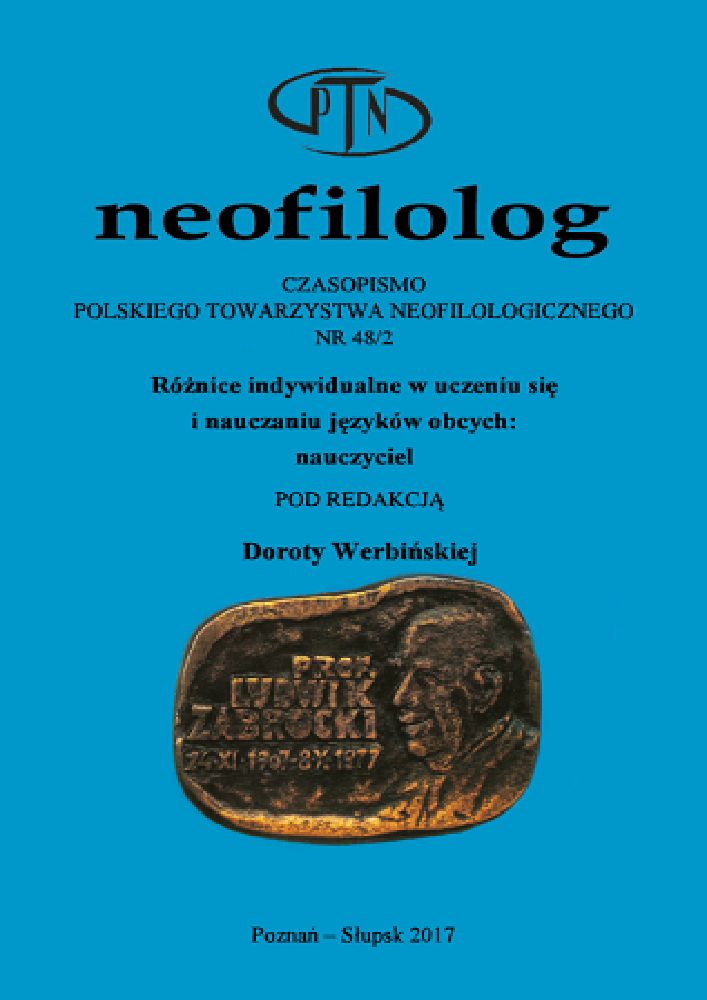Abstract
The tasks that the contemporary teachers of foreign languages face as well as the roles that they should assume as leaders of the educational process are of complex nature. This complexity is a result of numerous social changes and transformational processes. In response to these changes, educators’ roles keep being redefined so that the tasks that the teachers take up could be as effective as possible in the given time and space. These modified roles of teachers are the subject of this article. In the theoretical part, the results of the analysis of the literature on foreign language teaching are presented, with the focus on teacher roles and tasks. The analysis indicates the main development tendencies in foreign language teaching after the breakthrough caused by the communicative approach. The empirical part presents the outcome of research into how contemporary middle school students identify the roles and tasks of the teacher of German. The results of the study may contribute to the scholarly reflection on the role of the teacher in the foreign language teaching process.References
Brown, H. D. 2001. Teaching by principle – an interactive approach to language pedagogy. New York: Pearson Education.
Brzezińska, A. I. i Czub, T. 2013. „Zaufanie społeczne jako wyzwanie i ratunek dla polskiego systemu edukacji”. Nauka, 1: 31-44.
Dakowska, M. 2005. Teaching English as a foreign language. Warszawa: Wydawnictwo Naukowe PWN.
Dickinson, L. 1987. Self-Instruction in Language Learning. Cambridge: Cambridge University Press.
Jastrzębska, E. 2011. Strategie psychodydaktyki twórczości w kształceniu językowym (na przykładzie języka francuskiego). Kraków: Impuls.
Komorowska, H. 1988. Ćwiczenia komunikacyjne w nauce języka obcego. Warszawa: Wydawnictwa Szkolne i Pedagogiczne.
Komorowska, H. 2009. Metodyka nauczania języków obcych. Warszawa: Fraszka Edukacyjna.
Miastkowska, B. 2010. „Użycie języka ojczystego na lekcji języka obcego: sukces czy porażka?” Języki Obce w Szkole, 1: 46-50.
Michońska-Stadnik, A. 1996. Strategie uczenia się i autonomia ucznia w warunkach szkolnych. Wrocław: Wydawnictwo Uniwersytetu Wrocławskiego.
Nęcka, E. 2005. Trening twórczości. Gdańsk: GWP.
Ortega, L. 2007. „Meaningful L2 practice in foreign language classrooms: A cognitiveinteractionist SLA perspective”. (w) Practice in a Second Language. Perspectives from Applied Linguistics and Cognitive Psychology. (red. R. DeKeyser). Cambridge: Cambridge University Press, str. 180-207.
Pfeiffer, W. 2001. Nauka języków obcych. Od praktyki do praktyki. Poznań: Wagros.
Siek-Piskozub, T. 2001. Uczyć się bawiąc. Strategia ludyczna na lekcji języka obcego. Warszawa: Wydawnictwo Naukowe PWN.
Szpotowicz, M. (red.). 2011. Europejskie Badanie Kompetencji Językowych ESLC. Raport Krajowy 2011. http://eduentuzjasci.pl/badania/110-badanie/179-europejskie-badanie-kompetencji-jezykowych.html, DW 20.08.2017.
Watson, M. J. i Emerson, S. 1988. „Facilitate learning with humor ”. Journal of Nursing Education, 2: 89-90.
Wilczyńska, W. 1999. Uczyć się czy być nauczanym? O autonomii w przyswajaniu języka obcego. Warszawa: Wydawnictwo Naukowe PWN.
Zawadzka, E. 2004. Nauczyciele języków obcych w dobie przemian. Kraków: Impuls.
License
Copyright (c) 2017 Magdalena Białek

This work is licensed under a Creative Commons Attribution-NoDerivatives 4.0 International License.
Authors
Authors of texts accepted for publication in Neofilolog are required to complete, sign and return to the Editorial team’s office the Agreement for granting a royalty-free license to works with a commitment to grant a CC sub-license.
Under the agreement, the authors of the texts published in Neofilolog grant Adam Mickiewicz University in Poznań a non-exclusive, royalty-free license and authorize the use of Attribution-NoDerivatives 4.0 International (CC BY-ND 4.0) Creative Commons sub-license.
The authors retain the right to the free disposal of the work.
Users
Interested Internet users are entitled to use works that have been published in Neofilolog since 2017, under the following conditions:
▪ attribution – obligation to provide, together with the distributed work, information about the authorship, title, source (link to the original work, DOI) and the license itself.
▪ no derivatives – the work must be preserved in its original form. Without the author's consent, it is not possible to distribute the modified work in the form of translations, publications, etc.
Copyrights are reserved for all texts published since 2017.
Miscellaneous
Adam Mickiewicz University in Poznań retains the property right as a whole (layout, graphic form, title, cover design, logo etc.).
